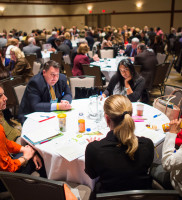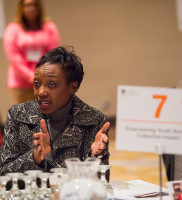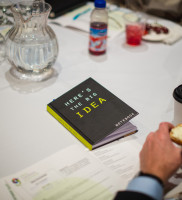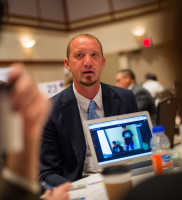For the first time ever, we had 40 unique, small group conversations called “Idea Exchanges” at our Ninth Annual Conference on Education. Matched to the core areas of Student Success 2025, the Idea Exchange brought together education, government, nonprofit, and business leaders around a variety of topics, from innovative practices happening in classrooms around Delaware, to helping students achieve success in college and careers.
Each Idea Exchange table concluded its session by naming one “big idea” that can make an impact in that particular focus area. Below you will find a distillation of all 40 “big ideas.”
Early Learning

| Topic | Big Idea |
| Addressing Social-Emotional Needs | Early social-emotional interventions such as universal preschool, ongoing coaching for staff, and supporting families’ basic needs. |
| Building and Supporting the Early Learning Workforce | Action plan and execution of action plan. Greater focus on early learning compensation and turnover reduction. Determine an organization to coordinate professional development in early learning and across kindergarten through third grade. |
| Engaging with Local Readiness Teams | Define the scope and sequence, metrics, development, and outcomes for Delaware Readiness Teams. |
| Reading by Third Grade |
|
| Strengthening Families Through Supports | Create a singular hub that effectively communicates resources via an app that shares info directly to parents/caregivers. |
| Transitioning to Kindergarten |
|
Personalized Learning

| Topic | Big Idea |
| Designing Schools of the Future | Support student agency |
| Developing Students’ Social Skills | All educators and families will develop their own social and emotional skills in order to support their children’s social and emotional development |
| Empowering Youth Through Collective Impact | Increase project-based learning efforts that can be sustained
|
| Integrating Arts and Academics | District-by-district pre-k opportunities for focused arts-based learning supported by:
|
| Integrating Health and Academics | Integrate with the healthy neighborhoods initiative to expand voice (community) and policy (i.e. HB 234) to consider health across K-12 age span. |
| Investing in Technology Infrastructure | No Big Idea card submitted |
| Reimagining Learning Through Technology | Create a network of example K-12 schools that are using technology to personalize learning (and learn from each other) |
| Supporting Students Experiencing Childhood Trauma | Schools work collaboratively to implement, train, and build capacity on trauma-informed, culturally sensitive, and restorative practices |
| Transforming the Student Experience | Using student voice and choice to create opportunities for academic growth |
| Integrating Supports for Students | Transparency of equity gaps and resources. Take the opportunity to re-direct resources to implement 21st century strategies |
Postsecondary Success

| Topic | Big Idea |
| Connecting Education and Business | Create a state-wide business/education council to brand and align education and business |
| Engaging Students Through Counseling Supports | Work to create supports to engage parents and support students at early ages through exposure to options, creating a plan for after high school, following students’ hopes and dreams, and meeting families where they are or through technology |
| Increasing Career Exploration Opportunities | Start with middle school exploration to create broader trajectory to high school choices and beyond |
| Increasing College Access | Advocate for earlier, integrated, and stronger college advising from pre-k through age 16 |
| Planning Education to Support Career Goals | Changing education stereotypes (good vs. bad, options/flexibility) through a statewide marketing campaign |
| Preparing Students for College and Career | All youth and young adults must have access to meaningful work-based learning experiences and peer/professional mentoring |
Educator Support and Development

| Topic | Big Idea |
| Advancing Teacher Leadership | Create a support network for teacher leaders to collaborate across the state. EdCamp Style! |
| Aligning Teacher Supply with School Needs |
|
| Collaborating on Digital Student Resources | Professional development time will be provided for teachers to engineer and collaborate on institutional products. Teachers will pilot other teachers’ products and provide specific feedback for improvement. Create a sustainable culture for collaboration. |
| Ensuring Equitable Access to Excellent Educators | Elevate the profession through continual improvements in teacher preparation, more frequent and more thoughtful observations, and earlier hiring focused on competencies, empowering principals to be instructional leaders |
| Preparing and Supporting Principal Candidates | Commit to aligning the principal pipeline to better meet the needs of educators and students, from preparation through ongoing professional development. Conduct a needs assessment of principal landscape, especially in high needs schools. Better prepare principal candidates by expanding experiential learning (e.g. internships, residencies, etc.), and overhaul the rigid unit count funding system to support these programs. |
| Preparing Teacher Candidates | Restructure teacher preparation so that there is a balance between theory and practice |
| Supporting and Developing Principals | Build a toolkit and provide staff development for principal supervisors to support and develop principals |
Fair and Efficient Funding

| Topic | Big Idea |
| Advocating for English Language Learners |
|
| Erasing Inequitable Access to Great Teachers | Fund schools based on needs, recruit and develop diverse teaching profession, make resource equity gaps transparent, and direct resources strategically |
| Measuring Education Investments |
|
| Supporting High-Needs Students | Better coordination of existing social support services for districts until the funding formula can be adjusted to order to integrate more services to high-needs schools closest to home, school, and community. Students’ needs should be served closest to their community. |
System Governance, Alignment, and Performance

| Topic | Big Idea |
| Addressing Needs Through Community Partnerships | Improve and centralize the collaboration between community partnerships, schools and parents |
| Collaborating Across School Boards | Develop a culture where boards empower and support their schools and school leaders.
|
| Finding the Best Educational Fit | Create pilot program consortium for all Wilmington elementary schools to provide a summer enrichment program for academics and exploration. Teachers and leaders from all schools working together to form relationships with students and each other. |
| Overcoming Barriers to Family Engagement |
|
| Transitioning to ESSA | ESSA gives us an opportunity to engage the community to assess and map the educational assets to drive student success and deconstruct our archaic funding system so that we can support schools effectively. |
| Connecting Research to Schools and Communities | Build a culture statewide that prioritizes research and its role in supporting and improving education. |









